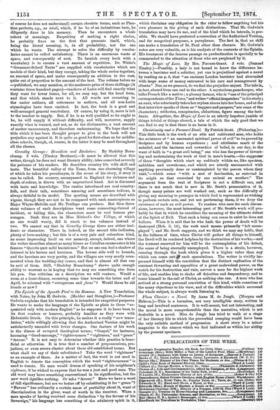The Epistle of the Apostle Paul to the Rotnans. A
New Translation, with Notes, by John H. Godwin. (Hodder and Stoughton.)—Professor Godwin explains that his translation is intended for exegetical purposes. He wants to make the language of the Epistle as plain to those "ac- quainted only with modern English" as he supposes it to have been to its first readers or hearers, probably familiar as they were with Hebraistic Greek. On this principle, he makes it a really "new trans- lation," while willingly allowing that the Authorised Version might be satisfactorily amended with fewer changes. One feature of his work is the disuse of accepted theological terms; "Gospel," for instance, becoming "Good-message," "righteousness" "rightness," and "grace" "favour." It is not easy to determine whether this practice is bene- ficial or otherwise. It is true that a number of prepossessions, pre- judices, or even errors cluster about these old-established terms. But what shall we say of their substitutes ? Take the word "rightness" as an example of them. As a matter of fact, the word is not used in English to denote the conception which the word " righteousness " is used to denote. No man would dream of speaking of his neighbour's rightness, if he wished to express thatle was a just and good man. The old word may have something conventional in its signification, but the new word signifies nothing. Or take "favour." Here we have a word of full significance, but are we better off by substituting it for " grace "? "Favour" has ordinarily a certain sense of partiality about it, want of discrimination in the giver, want of worth in the receiver. When a man speaks of having received some distinction "by the favour of his Sovereign," his language has something of the adulatory spirit in it,
which disclaims any obligation in the ruler to follow anything but his own pleasure in the giving of such distinctions. That Mr. Godwin's translation may have its use, and of the kind which he intends, is pos- sible. We should have preferred a correction of the Authorised Version,. and for exegetical purposes, a paraphrase. The fact is, that no skill can make a translation of St. Paul other than obscure. Mr. Godwin's notes are very valuable, as is his analysis of the contents of the Epistle. His treatment of the famous passage on predestination is specially to be- commended to the attention of those who are perplexed by it.






























 Previous page
Previous page